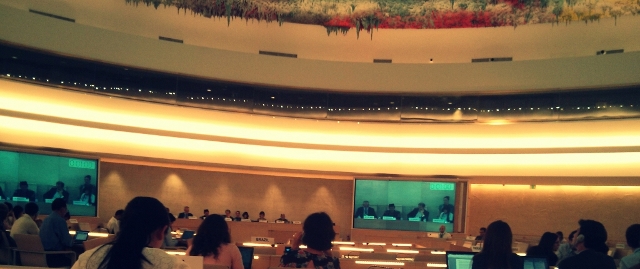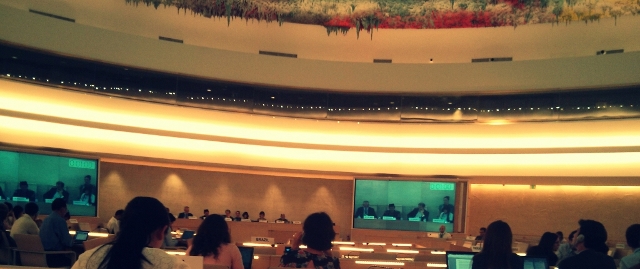Statement by Mr. Henry Saragih to the Open-ended intergovernmental working group on a United Nations declaration on the rights of peasants and other people working in rural areas
(Geneva, Palais des Nations, Room X, First session, 15 – 19 July 201)

Distinguished Delegates of the working group, Distinguished Panelists, Ladies and Gentlemen,
There is a strong reason for us to welcome this working group. This working group, first and foremost, is a testament that international cooperation is really needed in addressing challenges of today’s world. Member states, various organisations representing peasants and other people working in rural areas, research organisations, academia, institutions representing different tasks of United Nations, all put forward their time and energy to develop international cooperation for the future of promotion and protection of human rights of peasants and other people working in rural areas.
It is also worth remembered that United Nations has unique and important role in responding world’s challenge. In 2008, United Nations was very decisive in responding to the world food crisis. With special session of Human Rights Council in 22 May 2008, and with the establishment High Level Panel on the Global Food Crisis and the Right to Food with the session in Madrid (26-27 January 2009) and in UN General Assembly-New York (9 April 2009), international community addressed twin problem of food crisis: what crisis is this, and how to develop international cooperation –for good. UN Special Rapporteur on Right to Food, Mr. Olivier de Schutter, establish the very basic of international cooperation responding world food crisis –as it was then put forward by his report (A/HRC/9/23, 8 September 2008): “…the crisis is the result of insufficient incomes for those affected, imbalances of power in the food production and distribution chain, and disempowerment of the poor and marginalized segments of society.”
It was then Advisory Committee of UN Human Rights Council who endavour to address those question into anti-discrimatory measures and international cooperation. UN Human Rights Council has been subsequently working out a durable worldwide cooperation based on principle of UN Charter and human rights.
Standard-setting
In the very heart of human rights promotion and protection is a process of standard setting. We shall look into international cooperation on food and development. Deep in this effort is our will not to let same mistakes happened again as it was of the global food crisis. But, on a more of perspective of peasants, standard should be developed to recognise peasants and other people working in rural areas as legitimate party in those global cooperations in relation with food and rural development. Peasants and other people working in rural areas surely has our own perspective.
Positive practices around the world
A case of peasants livelihood never cease to exist in global development and debates. Organisations and other people working in rural areas are also a living testimony how a developed rural livelihood has been sustaining live of their own and others. In the last 15 years, it is important to note that rural livelihood involves not only a matter of production, but more importantly on culture, on policy in local or cluster level, and on legal reform.
It is more than right that those practices are recorded by the Advisory Committee of UN Human Rights Council (in the document of A/HRC/19/75). Those practices are of government policy, collective effort in local level, transnational engagement, institutionalisation of position of peasants and other people working in rural areas.
It is encouraging also to note that we sees development in the last 2 years. Including in this is the newly adopted of legislation on protection and empowerment of peasants by Indonesian House of Representatives (first week of July 2013). This, I believe, will also support the engagement between states where peasants and other people working in rural areas has been especially recognised as key group and vulnerable group – including, but not limited to, Bolivia, South Africa, Ecuador, Cuba, Burkina Faso, Mali, China, the Philippines and many others. We also sees different organisations and unions is related with rural empowerment in Europe such as in Spain, France, Switzerland (where organisation of Uniterre has been dedicated their work for food sovereignty), Belgium, Norway to name some.
Anti-dicrimination
It is without doubt that there are many violence and repression which take place in regard of peasants and other people working in rural areas. We keep on working how to best promote and protect rural population. The work, in this, involves a main thrust for anti-discriminatory measures. In this, I want to keep our hard work for anti-discrimination, including on rural wormen, indigenous peoples, fisherfolks, rural workers, on food sovereignty, all are key in the the human rights of peasants and other people working in rural areas. As I am practicaly involved in many reform in the field and on practical long-term improvement, I urge delegates to calibrate anti-discriminatory measures in the UN system and in international law and practices. We can look at where and how violations happens, but we can also look on what are better development so far.
Let us work for the best of our world.
Henry Saragih
ICC-La Via Campesina, On behalf of La Via Campesina

